
Skyrocket your search rankings with these essential AI writing tips
Table of Contents
Table of Contents- Understand the Basics of AI Writing for Search Engine Optimization
- Leverage AI Tools for Effective Keyword Research
- Crafting High-Quality, SEO-Optimized Content with AI
- Optimizing Content Strategy with AI-Driven Insights
- Enhancing Technical SEO with AI
- Monitoring and Adapting Your Content Strategy with AI
- Addressing Challenges and Ethical Considerations of AI Writing
- Best AI SEO Tools to Skyrocket Your Search Rankings
- Conclusion: Embracing AI for Sustainable SEO Success
- FAQs: Optimizing Your Content with AI Writing Tips
Are you ready to transform your content strategy and achieve unprecedented search engine optimization (SEO) results? In today’s digital landscape, leveraging the power of AI writing tips is no longer optional—it’s essential. Whether you’re a seasoned content marketing professional or just starting your blogging journey, understanding and implementing AI writing techniques can significantly boost your organic traffic and overall online presence. Let’s dive into how you can use AI to revolutionize your approach to content creation.
Understand the Basics of AI Writing for Search Engine Optimization
What is AI Writing and How Does It Impact SEO?
AI writing involves using artificial intelligence to generate content. But how does this impact SEO? The answer lies in AI’s ability to streamline various aspects of content creation, including keyword research, content generation, and optimization. By automating these processes, AI tools can help you create more efficient and effective content marketing strategies.
For example, AI can quickly analyze vast amounts of data to identify the most relevant keywords for your niche. It can then use these keywords to generate engaging and informative content that resonates with your target audience. Furthermore, AI can optimize your content for search engines by ensuring it meets specific criteria, such as readability, keyword density, and meta description optimization.
To improve search rankings with AI, it’s essential to understand how these tools work and how to use them effectively. AI isn’t just about generating text; it’s about creating content that is both human-friendly and search engine-friendly.
The Evolution of AI in Content Creation and Its SEO Implications
AI has transformed content creation, making it faster and more efficient. Early AI writing tools were limited to basic text generation, but today’s advanced AI can produce high-quality, SEO-optimized content. This evolution has significant implications for SEO.
Initially, SEO professionals were skeptical about using AI-generated content, fearing it would lack the creativity and authenticity of human-written content. However, as AI technology has advanced, these concerns have diminished. Modern AI tools can now generate content that is not only well-written but also tailored to specific audiences and optimized for search engines.
Moreover, AI can analyze vast amounts of data to predict search trends and user behavior, allowing you to create content that is both timely and relevant. This capability is particularly valuable in today’s fast-paced digital environment, where trends can change in the blink of an eye. As a result, an AI-first content strategy is essential for brands to increase their visibility in AI search engines.
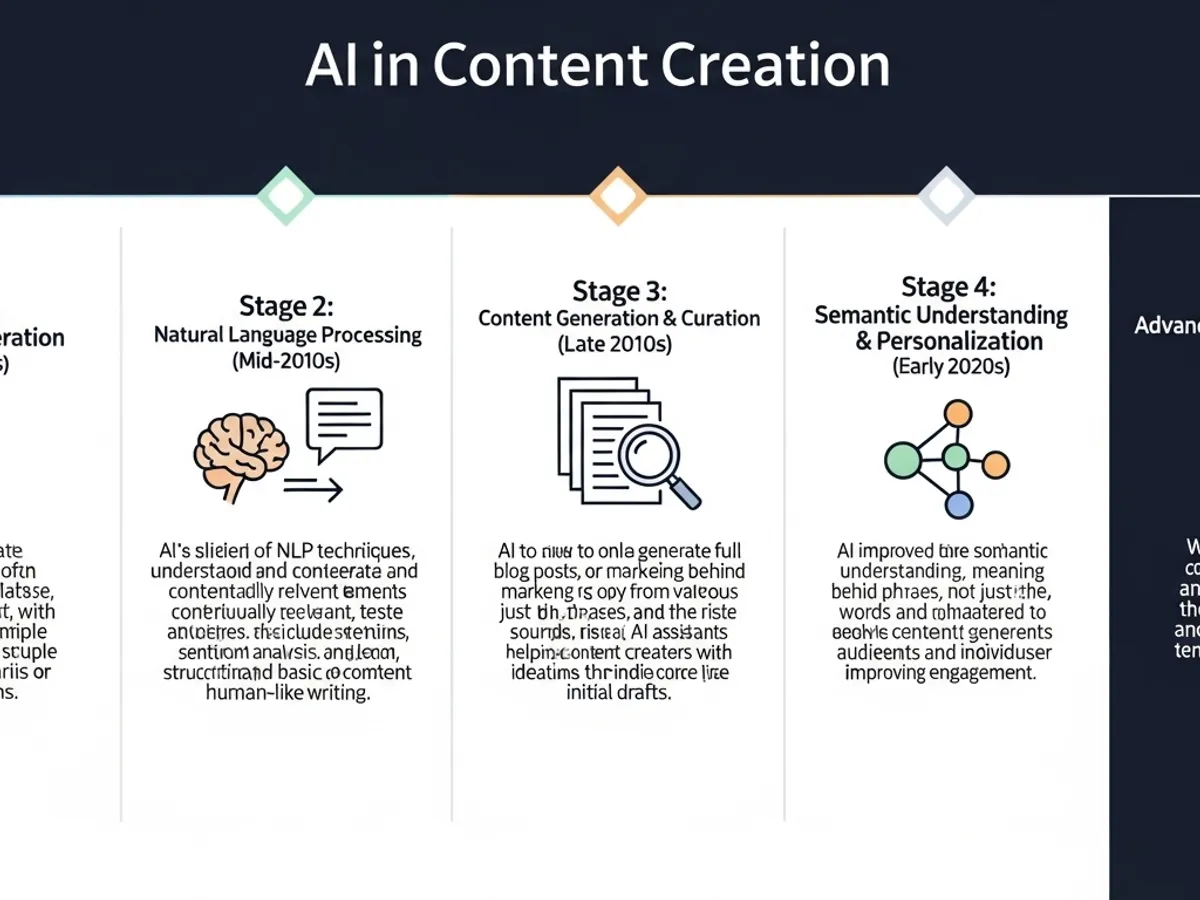
Leverage AI Tools for Effective Keyword Research
Using AI-Powered Tools for Keyword Discovery
Keyword research is the foundation of any successful SEO strategy. AI-powered tools simplify this process by identifying high-opportunity keywords based on search intent and competition. Tools like Nightwatch and GenWrite’s AI SEO Agent can automatically generate hundreds of keyword suggestions, analyze SERP competition, and cluster them by intent or topic.
For instance, GenWrite’s AI blog generator excels at uncovering niche-specific keywords that might be missed by traditional methods. By leveraging AI, you can quickly identify keywords that have the potential to drive significant organic traffic to your website. This approach saves time and ensures you’re targeting the most relevant and valuable keywords for your content marketing efforts.
Identifying Long-Tail Keywords and Semantic Variations with AI
AI excels at identifying long-tail keywords and semantic variations that can significantly improve search rankings with AI. Long-tail keywords are longer, more specific phrases that often have lower competition and higher conversion rates. AI writing tools can analyze search queries and user behavior to uncover these hidden gems.
Semantic variations, on the other hand, are related terms and phrases that help search engines understand the context of your content. By incorporating semantic variations into your content, you can improve its relevance and ranking for a wider range of search queries. For example, instead of repeatedly using the keyword “SEO optimization,” you can use variations like “search engine optimization techniques” or “improve rankings.”
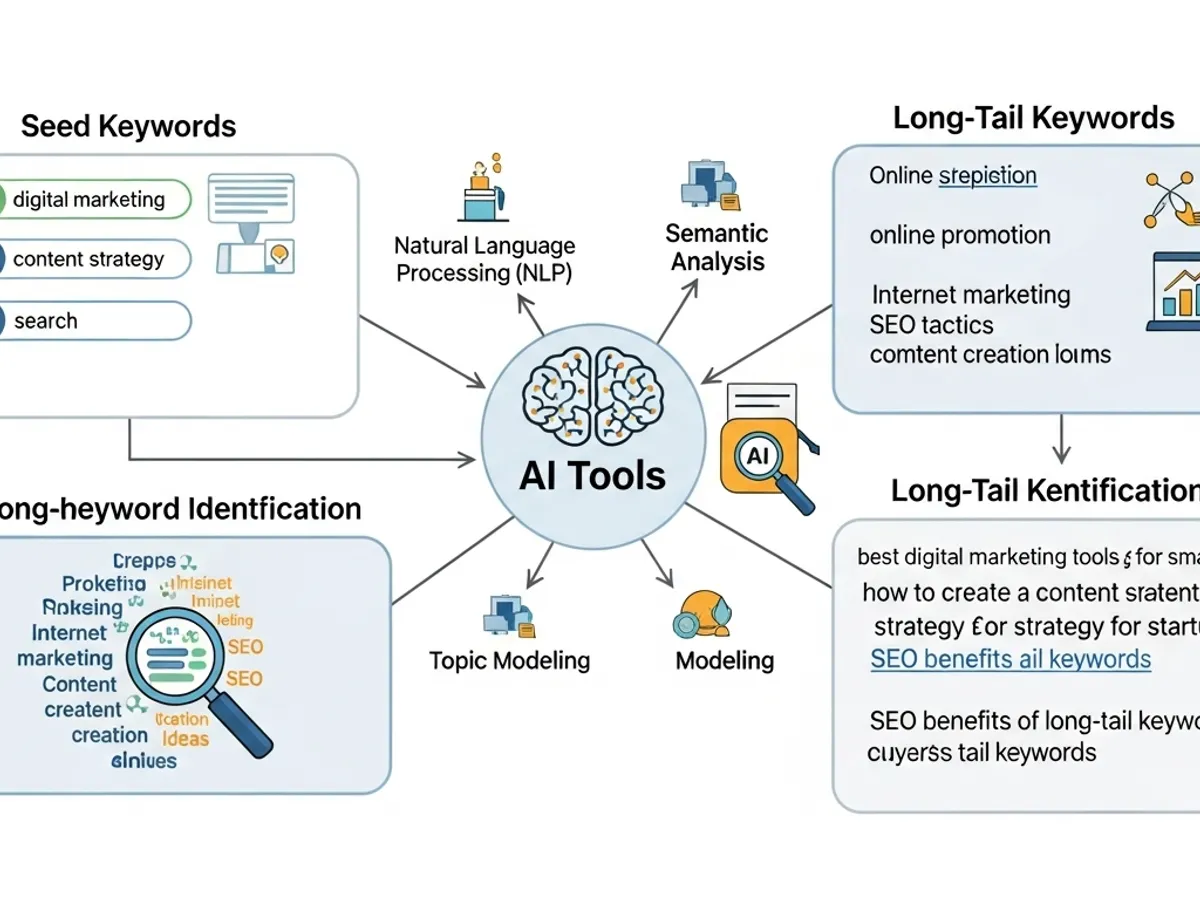
Crafting High-Quality, SEO-Optimized Content with AI
Generating New SEO Blog Posts from Scratch Using AI
Generating new SEO blog posts from scratch using AI is now easier than ever. AI writing tools like GenWrite automate the entire process, from keyword research to content creation and optimization. By providing the AI with a few basic inputs, such as your target keyword and desired tone, you can generate a complete blog post in minutes.
GenWrite is an AI blog generator that automates the end-to-end blog creation process, focusing on SEO optimization. It researches keywords, adds relevant links and images, analyzes competitor content, and automatically publishes blogs to help users increase website traffic and organic reach. AI writing assistants can also help you craft compelling headlines, write engaging introductions, and structure your content for maximum impact.
Structuring Content for AI Search Engines
To ensure your content is easily discoverable by AI search engines, it’s crucial to focus on credibility, trust, and quality. AI optimization tools allow you to make changes that not only help you check website rankings but also improve search rankings with AI by making your content contextually relevant. This means organizing your content in a way that is both user-friendly and search engine-friendly.
Here are some tips for structuring your content for AI search engines:
- Use clear and concise headings and subheadings: This helps both users and search engines understand the main points of your content.
- Incorporate relevant keywords throughout your content: But avoid keyword stuffing, which can harm your rankings.
- Use bullet points and lists: This makes your content easier to read and digest.
- Include images and videos: Visual content can enhance user engagement and improve your content’s overall appeal.
- Optimize your meta descriptions: This is the snippet of text that appears in search results, so make sure it’s compelling and accurately reflects your content.
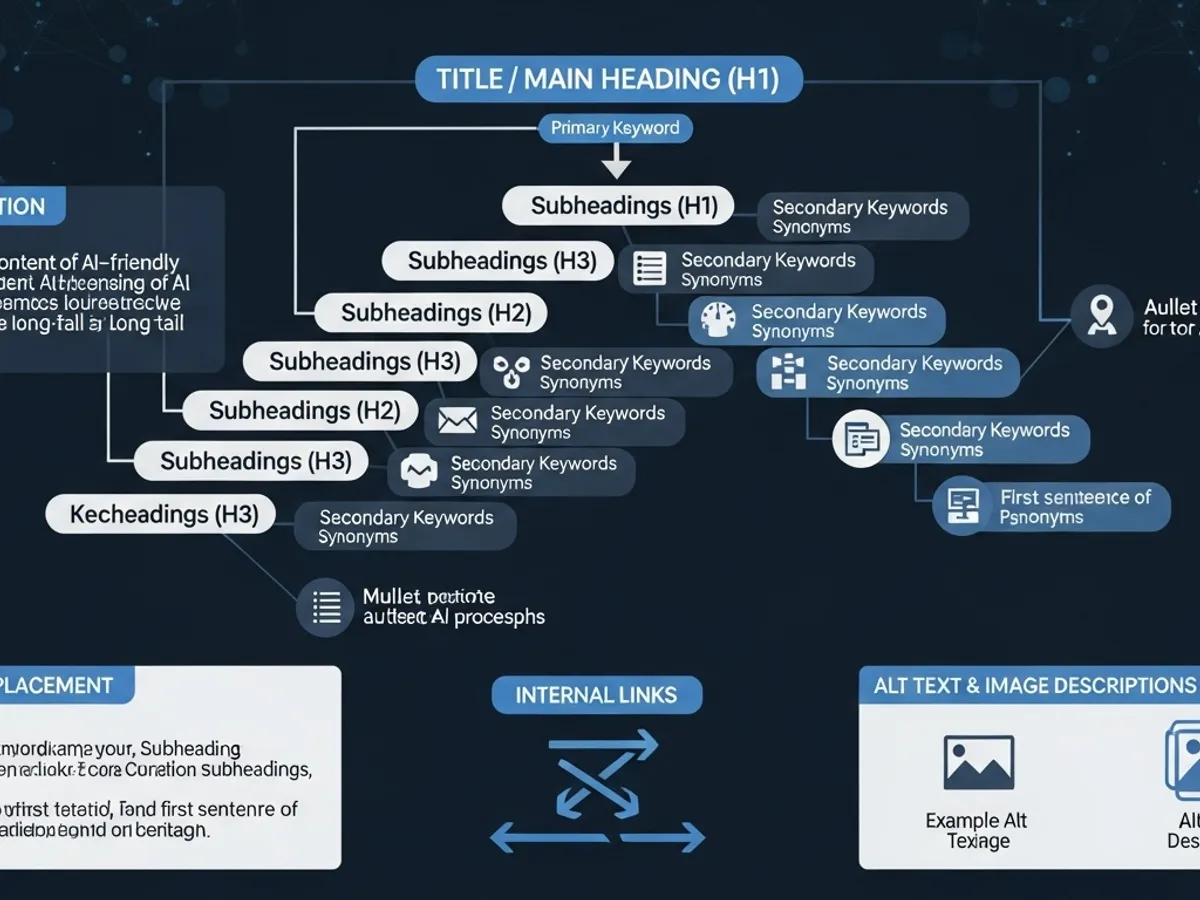
Optimizing Content Strategy with AI-Driven Insights
Analyzing Competitor Benchmarks and Identifying Content Gaps
Use AI to analyze competitor benchmarks and identify content gaps, allowing you to create targeted pages that improve search rankings with AI. AI tools can quickly assess your competitors’ top-performing content, identify the keywords they’re targeting, and uncover areas where they may be lacking. By understanding your competitors’ strengths and weaknesses, you can develop a content strategy that gives you a competitive edge.
For example, GenWrite’s competitor analysis feature allows you to compare your content with your competitors’ top keywords and pages. This helps you identify what kinds of content you can create that can drive lots of traffic to your site. By focusing on content gaps, you can create unique and valuable content that attracts organic traffic and improves your SEO.
Personalizing User Experiences with AI-Driven Content Recommendations
AI enables personalized content recommendations, enhancing user experience and boosting SEO. By analyzing user behavior and preferences, AI tools can deliver tailored content recommendations that resonate with individual users. This personalization can lead to increased engagement, longer time on site, and higher conversion rates.
For instance, if a user has previously shown interest in AI writing tools, they may be more likely to engage with content that discusses the benefits of using AI for content creation. By delivering personalized content recommendations, you can create a more engaging and relevant experience for your users, which can ultimately lead to improved SEO.
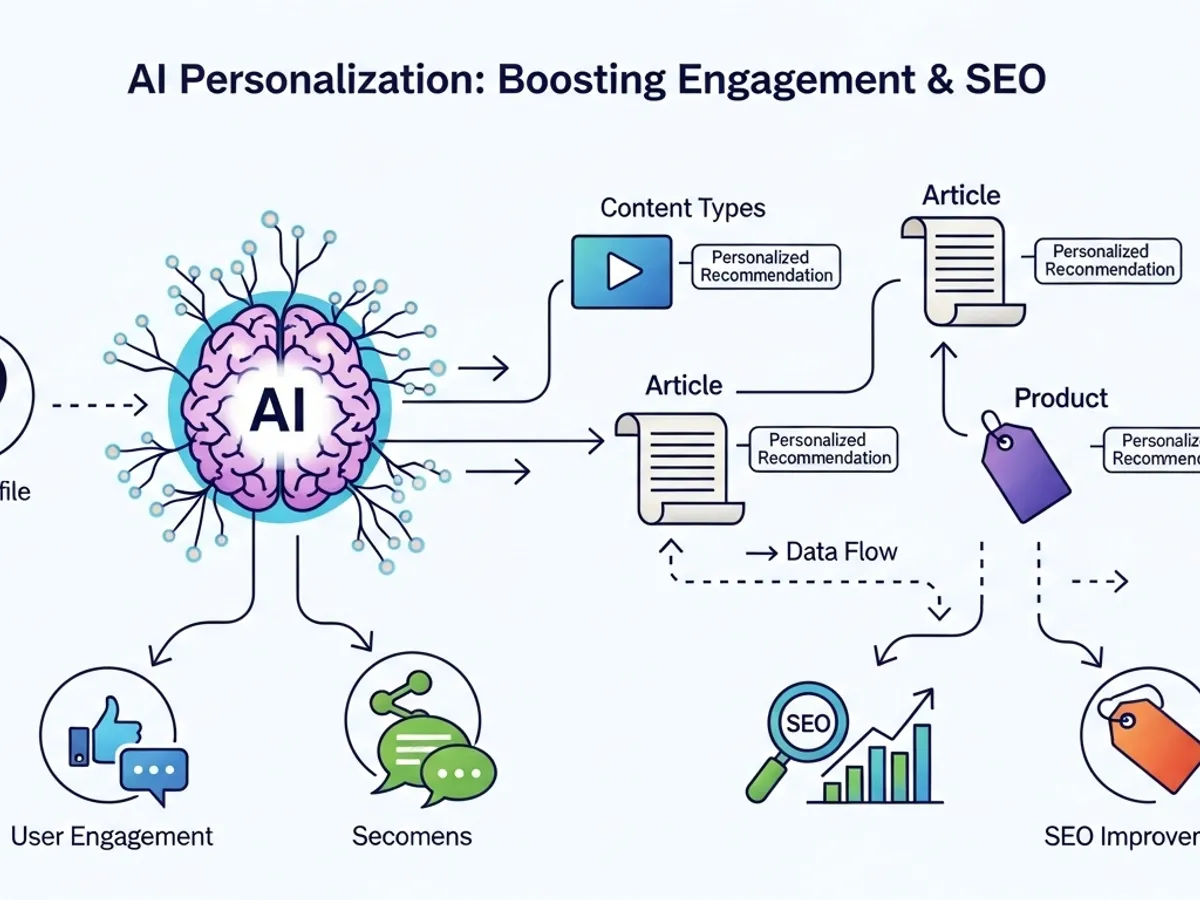
Enhancing Technical SEO with AI
Automating SEO Campaigns with AI-Driven Tools
AI-driven tools automate entire SEO strategies, from keyword research to content creation and ranking analysis. This automation can save you a significant amount of time and effort, allowing you to focus on other important aspects of your business. For example, AI tools can automatically generate meta descriptions, optimize image alt text, and build internal links.
By automating these tasks, you can ensure that your website is always optimized for search engines, without having to spend hours manually tweaking each page. Additionally, AI can continuously monitor your website’s performance and make adjustments as needed, ensuring that you’re always staying ahead of the curve.
Optimizing Website Structure and User Experience with AI
AI improves website structure and user experience, leading to better SEO performance. By analyzing user behavior and website data, AI tools can identify areas where your website may be lacking. For example, AI can identify pages that have high bounce rates, slow loading times, or poor mobile responsiveness.
By addressing these issues, you can create a website that is both user-friendly and search engine-friendly. A well-structured website with a positive user experience is more likely to rank higher in search results, attract organic traffic, and convert visitors into customers.
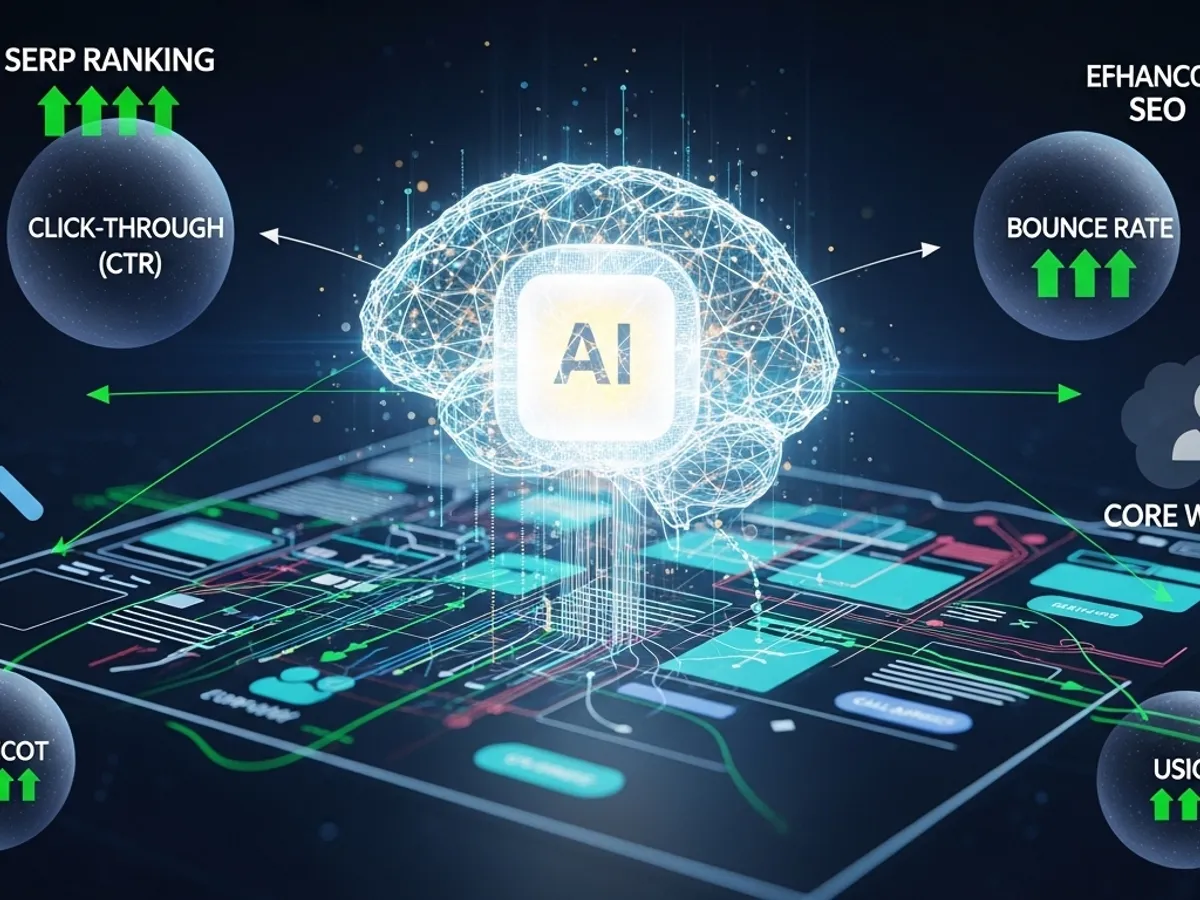
Monitoring and Adapting Your Content Strategy with AI
Tracking Content Performance and Making Data-Driven Decisions
Use AI to track content performance and make data-driven decisions, ensuring continuous improvement of your SEO efforts. AI tools can provide valuable insights into how your content is performing, including metrics like page views, bounce rates, time on site, and conversion rates. By analyzing this data, you can identify what’s working and what’s not, and make adjustments to your content strategy accordingly.
For example, if you notice that a particular blog post has a high bounce rate, you may need to revise the content to make it more engaging or relevant. Alternatively, if you see that a particular keyword is driving a lot of traffic to your website, you may want to create more content around that keyword.
Adapting to Search Trends and Algorithm Updates with AI
AI helps you adapt to changing search trends and algorithm updates, keeping your content relevant and high-ranking. Search engine algorithms are constantly evolving, so it’s important to stay up-to-date on the latest changes. AI tools can monitor search trends and algorithm updates, providing you with valuable insights into how to adapt your content strategy.
For example, if a search engine releases a new algorithm update that prioritizes mobile-friendliness, you may need to optimize your website for mobile devices. By staying informed about these changes, you can ensure that your content remains relevant and high-ranking.
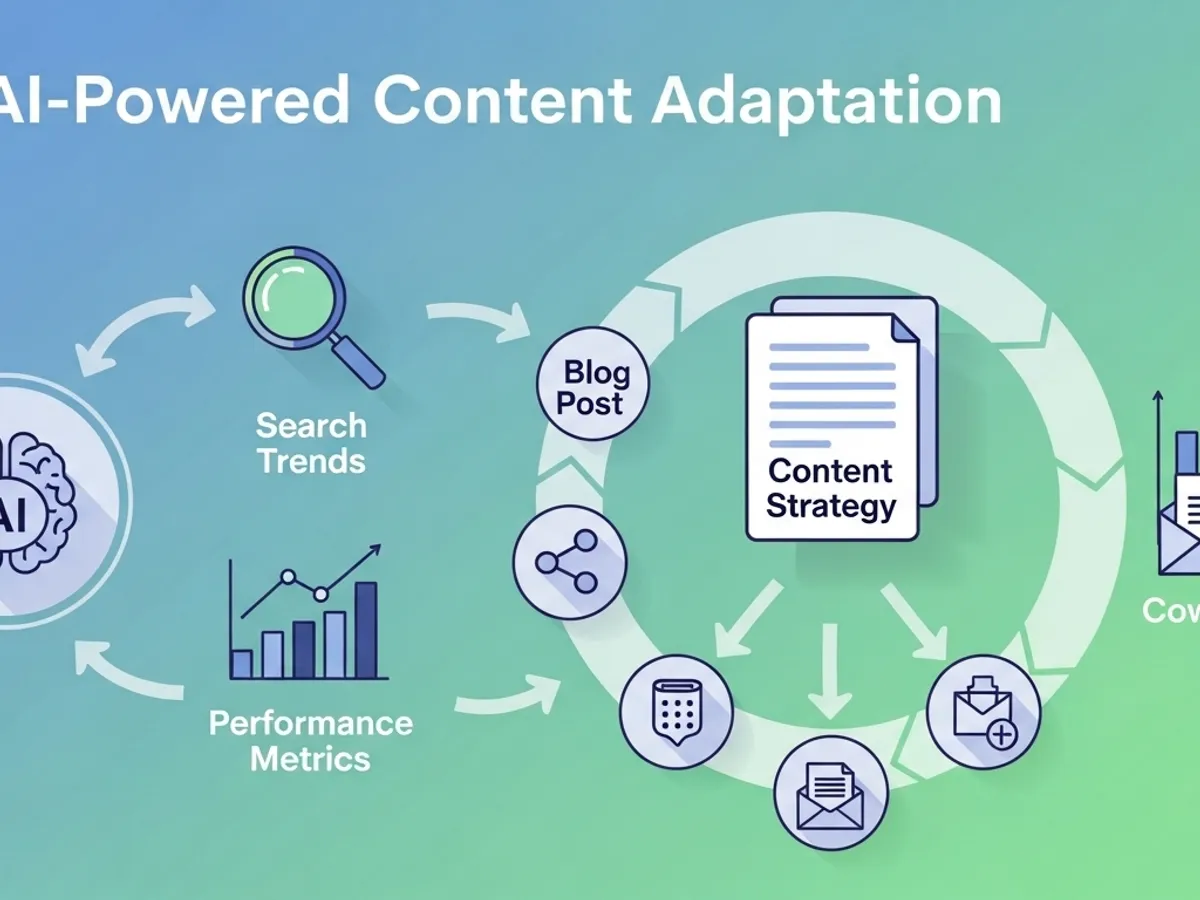
Addressing Challenges and Ethical Considerations of AI Writing
Overcoming Limitations of AI-Generated Content
It’s important to acknowledge the limitations of AI writing and implement strategies to overcome them. While AI can generate content quickly and efficiently, it may not always produce content that is accurate, original, or engaging. Therefore, it’s essential to carefully review and edit AI-generated content to ensure it meets your standards.
One common limitation of AI writing is its tendency to produce generic or repetitive content. To overcome this, you can provide the AI with more specific and detailed prompts, or use AI tools that allow you to customize the tone and style of the content. Additionally, it’s important to fact-check AI-generated content to ensure it’s accurate and up-to-date.
Ensuring Authenticity and Avoiding Plagiarism in AI Content
Ensure authenticity and avoid plagiarism when using AI for content creation, maintaining ethical standards. Plagiarism is a serious concern when using AI writing tools, as AI can sometimes generate content that is similar to existing content on the web. To avoid plagiarism, it’s important to use AI tools that have built-in plagiarism detection features.
Additionally, you should always review AI-generated content to ensure it’s original and doesn’t infringe on any copyrights. By taking these precautions, you can ensure that your content is both ethical and effective.

Best AI SEO Tools to Skyrocket Your Search Rankings
Conductor
Conductor uses AI technology to help you compare your content with your competitors’. After reviewing your competitor’s top keywords and pages, you should have a better idea of what kinds of content you can create that can drive lots of traffic to your site. Conductor’s AI-powered Content Guidance tool will keep a list of keywords and research them further.
SEMrush
SEMrush integrates keyword research with its SEO Content Template, which uses AI to suggest semantically related words, competitor benchmarks, and optimal readability levels—all essential for creating content that ranks.
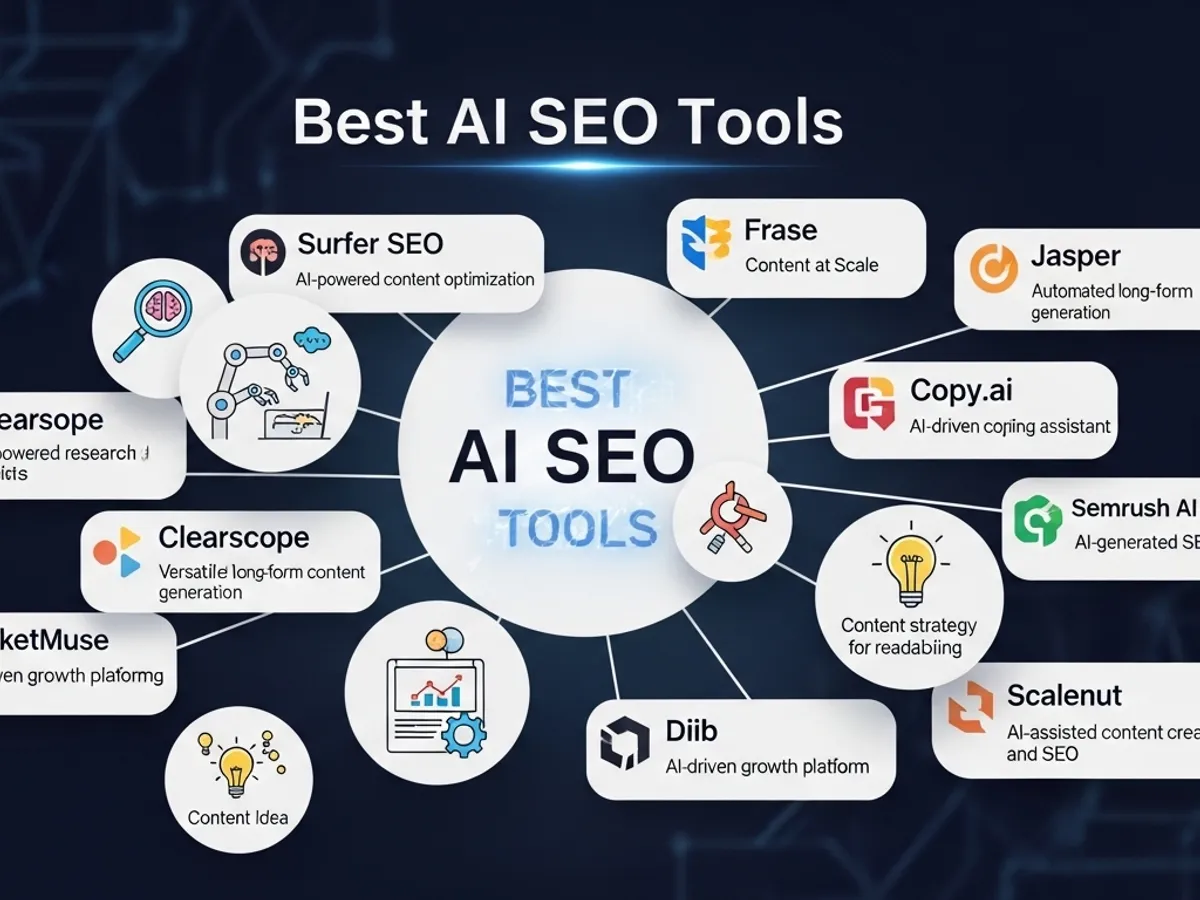
As genwrite, we aim to provide high-quality, SEO-friendly content that aligns with search engine guidelines and LLMs. Explore our blog for more information.
To unlock blog success with cutting-edge AI writing strategies, consider how AI blog writing is revolutionizing content marketing. AI tools streamline keyword research, content creation, and SEO optimization. Tools like GenWrite automate blog creation, enhance on-page SEO, and drive traffic.
To unleash your content’s potential with advanced AI writing, understand that AI content creation revolutionizes marketing by enhancing SEO, increasing engagement, uncovering traffic opportunities, and streamlining blogging processes with tools like GenWrite.
With GenWrite, you can unlock website traffic with expertly crafted AI blog posts. AI is revolutionizing content marketing, offering opportunities for traffic generation, SEO optimization, and content automation. Leverage AI writing assistants and data-driven strategies to unlock your blog’s potential and achieve results.
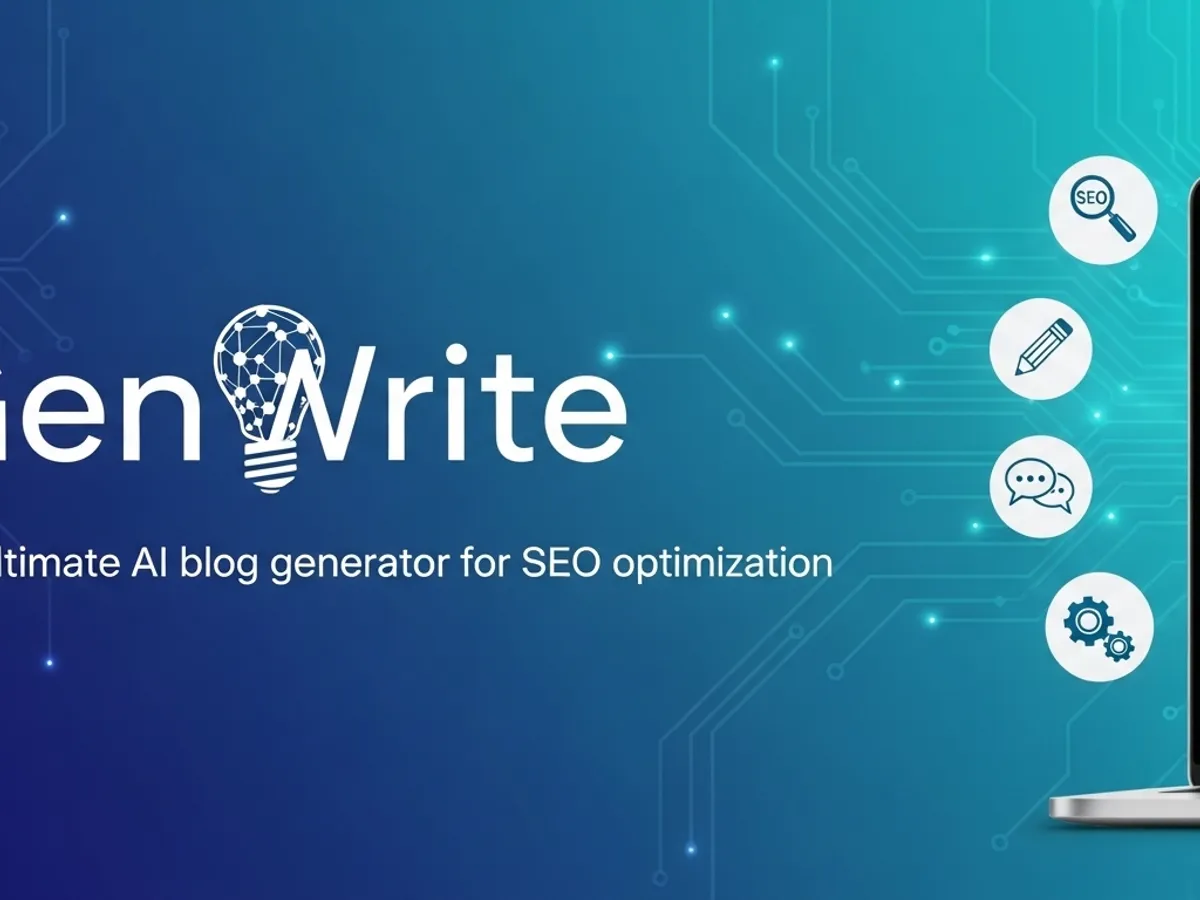
Conclusion: Embracing AI for Sustainable SEO Success
The Future of AI in SEO and Content Marketing
The future of AI in SEO and content marketing is bright, with the potential for sustainable success. As AI technology continues to evolve, it will become even more integrated into the content creation process. From keyword research to content optimization, AI will play an increasingly important role in helping businesses achieve their SEO goals.
Integrating AI into Your Content Strategy for Long-Term Growth
To achieve long-term growth and improve search rankings with AI, it’s essential to integrate AI into your content strategy. This means using AI tools to streamline your keyword research, generate high-quality content, optimize your website structure, and track your content’s performance. By embracing AI, you can create a content strategy that is both efficient and effective, allowing you to achieve sustainable SEO success.
AI is revolutionizing SEO by enabling businesses to optimize content, predict search trends, and personalize user experiences. AI writing tools make it easier, faster, and more efficient to identify high-performing keywords, analyze competitors, and optimize content strategy. By leveraging AI for data analysis, small businesses can make data-driven decisions and continuously improve search rankings with AI efforts.
FAQs: Optimizing Your Content with AI Writing Tips
How can AI help with keyword research for SEO?
AI tools can analyze large datasets to identify high-opportunity keywords, suggest related terms, and assess competition, saving time and improving targeting. This helps in creating a more effective content strategy.
What are the best practices for using AI to generate content?
Focus on crafting detailed prompts, fact-checking AI-generated content, and adding a human touch to ensure quality and relevance. By providing clear instructions, you can significantly improve search rankings with AI.
How does AI enhance content optimization for search engines?
AI tools can analyze top-performing pages to provide actionable insights on structuring and improving your content for better rankings. This includes optimizing for SEO and enhancing user experience.
Can AI automate SEO campaigns effectively?
AI-driven tools can automate various aspects of SEO, from keyword research to content creation and ranking analysis, streamlining the process. This can lead to significant improvements in organic traffic.
What are the ethical considerations when using AI for content creation?
Ensure authenticity and avoid plagiarism by verifying AI-generated content and adding original insights to maintain ethical standards. This is crucial for maintaining credibility and avoiding penalties from search engines.
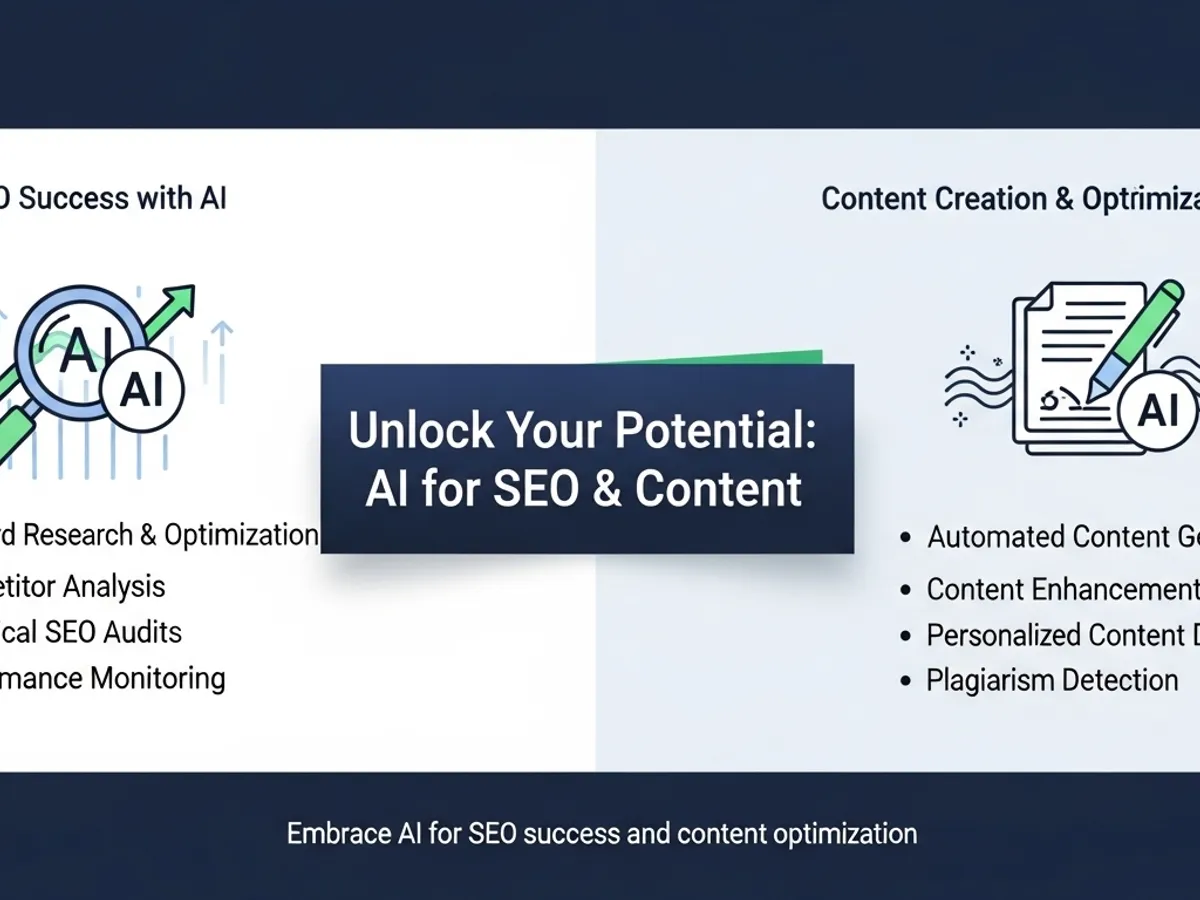
Ready to revolutionize your content creation process? Explore the power of GenWrite and start creating high-quality, SEO-optimized content today! Visit us at GenWrite to learn more.